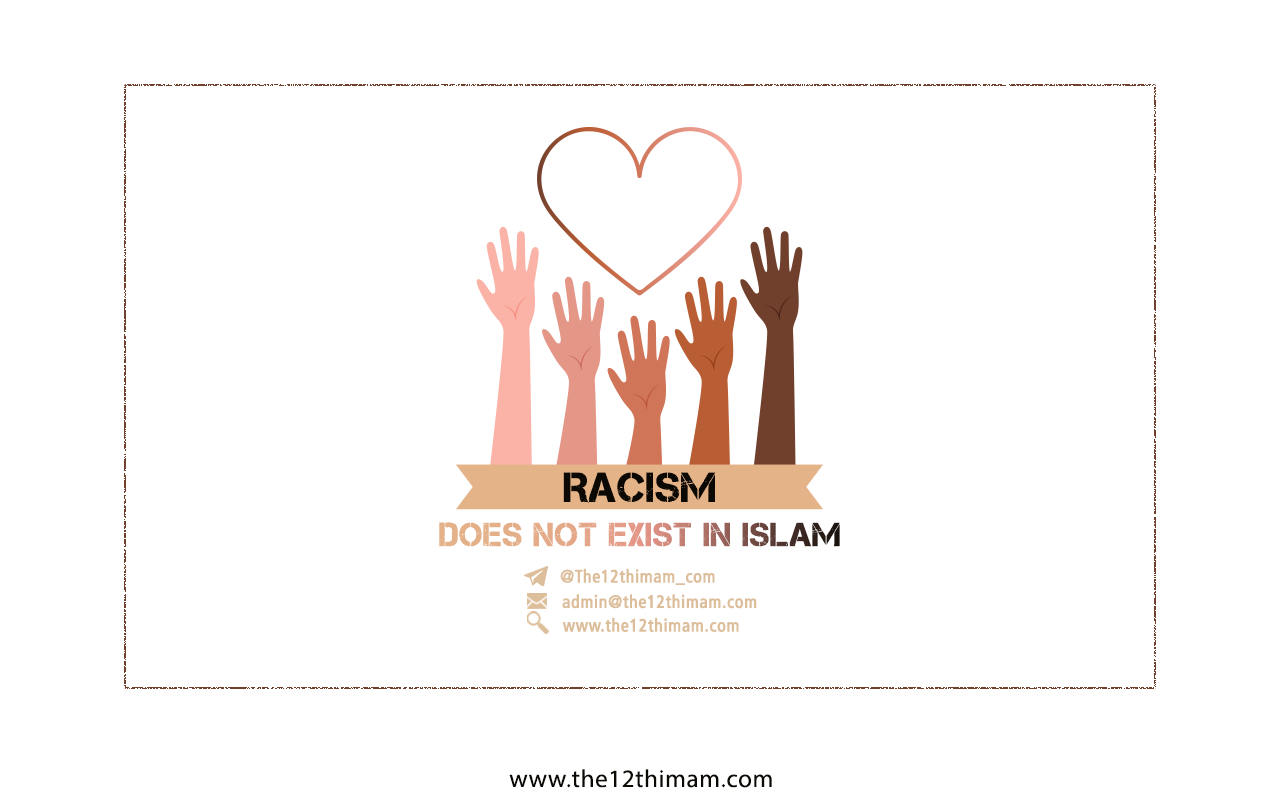In the Age of Ignorance, racism prevailed badly. People who were black and non-Arab had no privilege. These people were utilized only as slaves for the comfort and benefits of Arab aristocrats.
The Prophet (a) lived in such an age and among such people. With the emergence of Islam, and the beginning of prophetic mission, he (a) was commissioned to revoke all wrong traditions and superstitions of the Age of Ignorance; therefore, he (a) rejected racism due to social reformation and brought freedom and dignity to them.
Also, the glorious Qur’an and the Ahl al-Bayt (a) seriously fought against mutual vainglory and racist privileges; which we will mention here.
The glorious Qur’an says,
“O mankind! Indeed, We created you from a male and a female, and made you nations and tribes that you may identify yourselves with one another. Indeed, the noblest of you in the sight of Allah is the most Godwary among you. Indeed, Allah is all-knowing, all-aware.” (49:13)
In the interpretation of this verse, ‘Allama Tabataba’i said, “If we accept the coverage of the verse, the Qur’an has actually rejected all class differences that cause self-glorification and no human being is superior to others, except in God-wariness.”
It is mentioned in the occasion of the revelation of this verse which suggests the above issue,
It is narrated that one of the slaves of Bani Bayada tribe had proposed to one of their daughters. The Prophet (a) told the girl’s family to agree with it. They answered, “O Prophet of God! Should we give our daughters to slaves?!” So, the above verse was revealed and rejected such self-glorification.
During 23 years of his mission, the Prophet (a) prohibited Arabs from relative and tribal mutual vainglory in different opportunities and situations and said, “Do not mention your lineages to me; rather, mention your actions.”
After the conquest of Mecca, in the most critical situation, he (a) made a sermon and mentioned the Islamic equity to all people,
“O people! Beware that your God is One and your father, Prophet Adam, is one; thus, beware that no Arabs has any superiority over non-Arabs vice versa; and no black has any superiority over white vice versa, except due to God-wariness. Did I mention this truth?”
They said, “yes.”
Then, the Prophet (a) said, “The present ones should inform the absent ones.”
Also, in a sermon he (a) gave in his Last Hajj, once again he (a) reminded this fact, “O people! All of you are from Adam and Adam was from soil and in fact, the most honorable among you is the most God-wary of you.”
Elsewhere, he (a) said, “Undoubtedly, God does not regard your races, families, bodies or wealth; rather, He regards your hearts and bestows His mercy upon the one having more righteous heart and you are all children of Adam and the most beloved among you before God is the most God-wary of you.”
Also, in a narration, a man from Balkh said,
“In the travel to Khurasan, I was at the presence of Imam al-Rida (a). They brought food and Imam al-Rida (a) called all his servants including the blacks and asked them to sit for having food together with them.
I said, “May I be at your ransom! It would be better that they eat separately.”
Imam al-Rida (a) said, “Be quiet! God of all of us is One; our father and mother are the same and everyone’s reward on the Judgment Day depends on their actions.” (Meaning that the race and color does not matter and only faith and righteous action of the person is important.)
These reports show that Islam is against any racism and does not see differences of people in color, lineage, etc.
Sources:
The Qur’an, 49:13.
Tabataba’i, Mohammad Hossein, al-Mizan, translated by Sayyid Mohammad Baqer Musavi Hamadani, Qom, Islamic Publications of the Society of Seminary Teachers, 5th printing, 1375 SH, vol. 18, pp. 487 – 490.
Haqqi Barusawi, Isma’il, Tafsir Ruh al-Bayan, Beirut, Dar al-Fikr, nd., vol. 9, p. 90.
Makarem Shirazi, Nasir, Tafsir-e Nemuneh, Terhan, Dar al-Kutub al-Islamiyya, 1st Ed., 1374 SH, vol. 22, pp. 199-200.
Ya’qubi, Muhammad b. Abi Ya’qub, Tarikh Ya’qubi, Beirut, Dar Sadir, nd., vol. 2, p. 110.
Majlisi, Muhammad Baqir, Bihar al-anwar, Beirut, Mussasat al-Wafa’, 1404 AH, vol. 46, p. 177.
Qurtubi, Muhammad b. Ahmad, al-Jami‘ li ahkam al-Qur’an, Tehran, Naser Khosro, 1364 SH, vol. 16, p. 342.
Salihi Shami, Muhammad b. Yusuf, Subul al-Huda, researched by ‘Adil Ahmad ‘Abd al-Mawjud, Beirut, Dar al-Kutub al-‘Ilmiyya, 1st Ed., 1414 AH, vol. 8, p. 482.
Harrani, Hasan b. Shu‘ba, Tuhaf al-‘Uqul, Qom, Islamic Publications of the Society of Seminary Teachers, 2nd printing, 1404 AH, p. 34.
Ya‘qubi, Muhammad b. Abi Ya‘qub, Ibid.
Miqrizi, Taqi al-Din Ahmad b. Ali, al-Imta‘ al-Isma‘, researched by Muhammad ‘Abd al-Hamdi Namisi, Beirut, Dar al-Kutub al-‘Ilmiyya, 1st Ed., 1420 AH, vol. 1, p. 393.
Bihar al-Anwar, vol. 49, p. 101.



